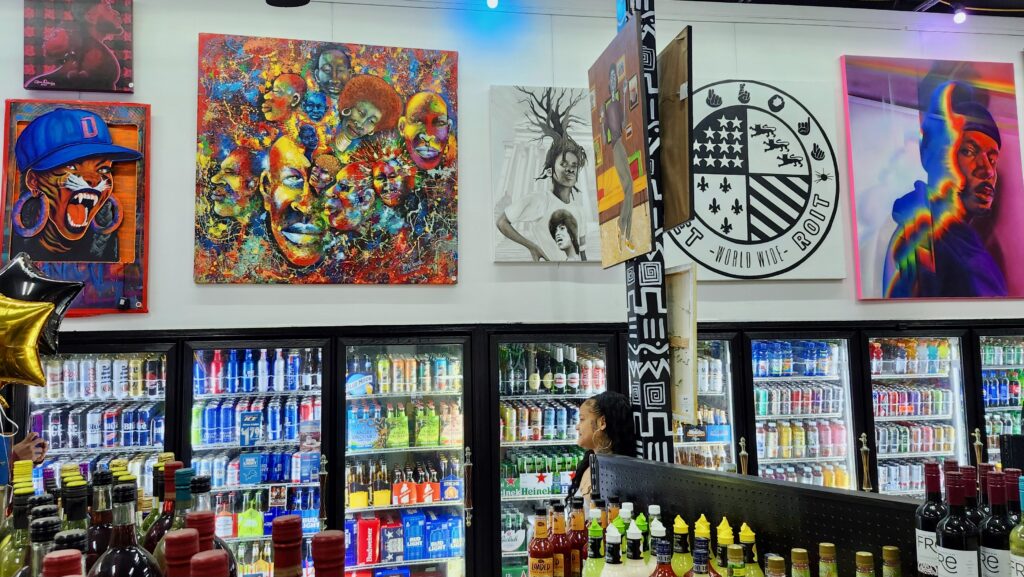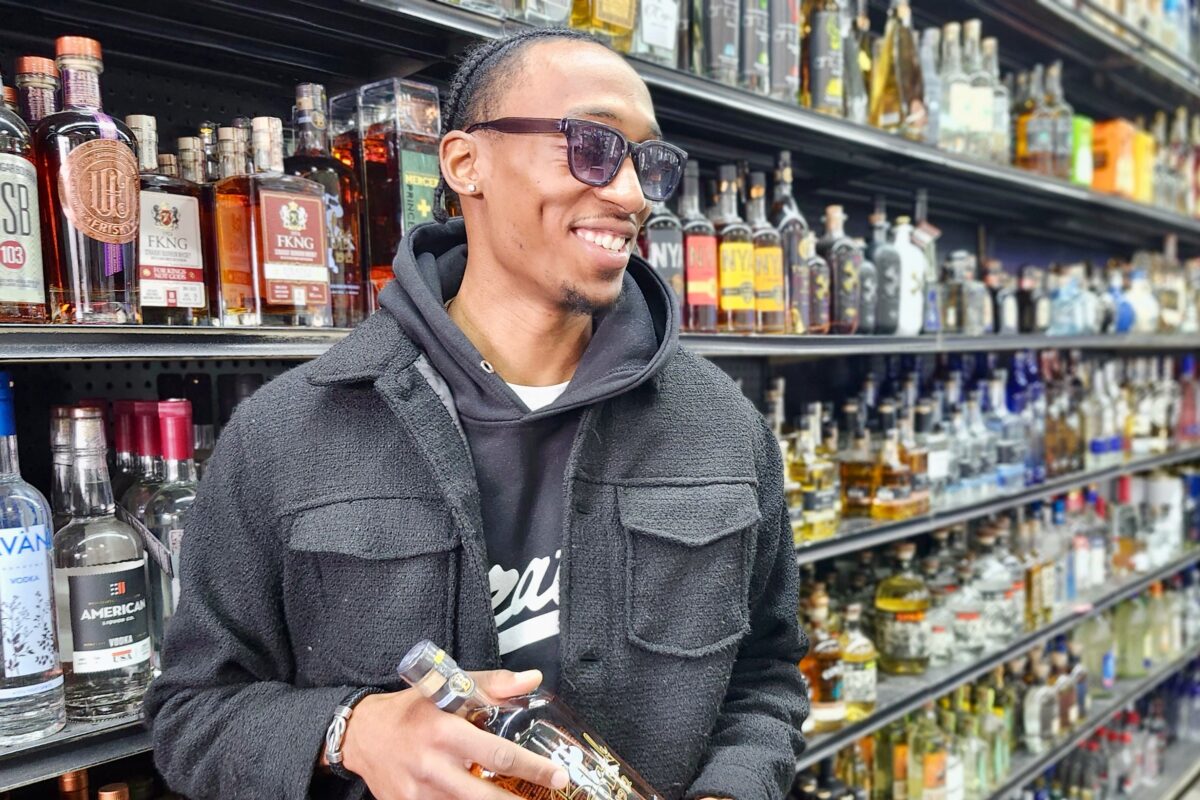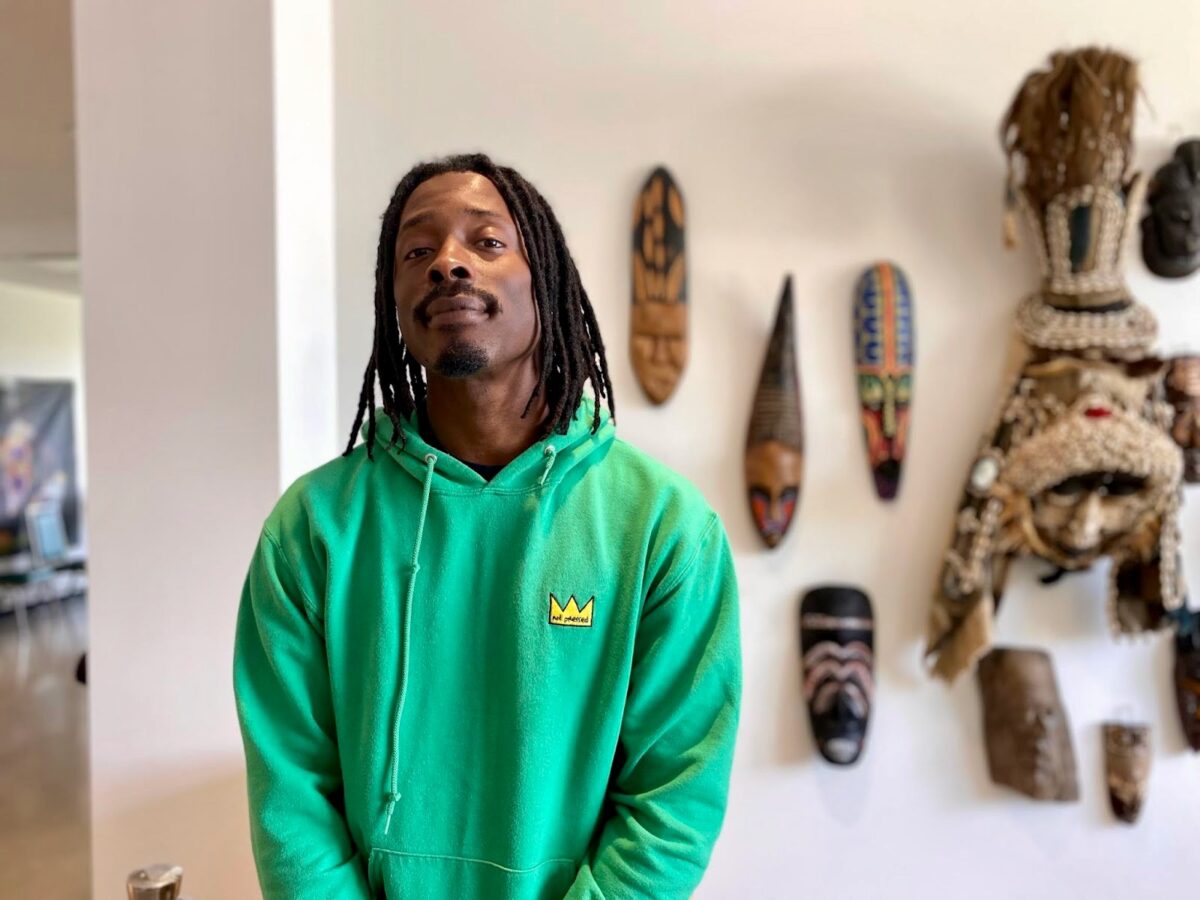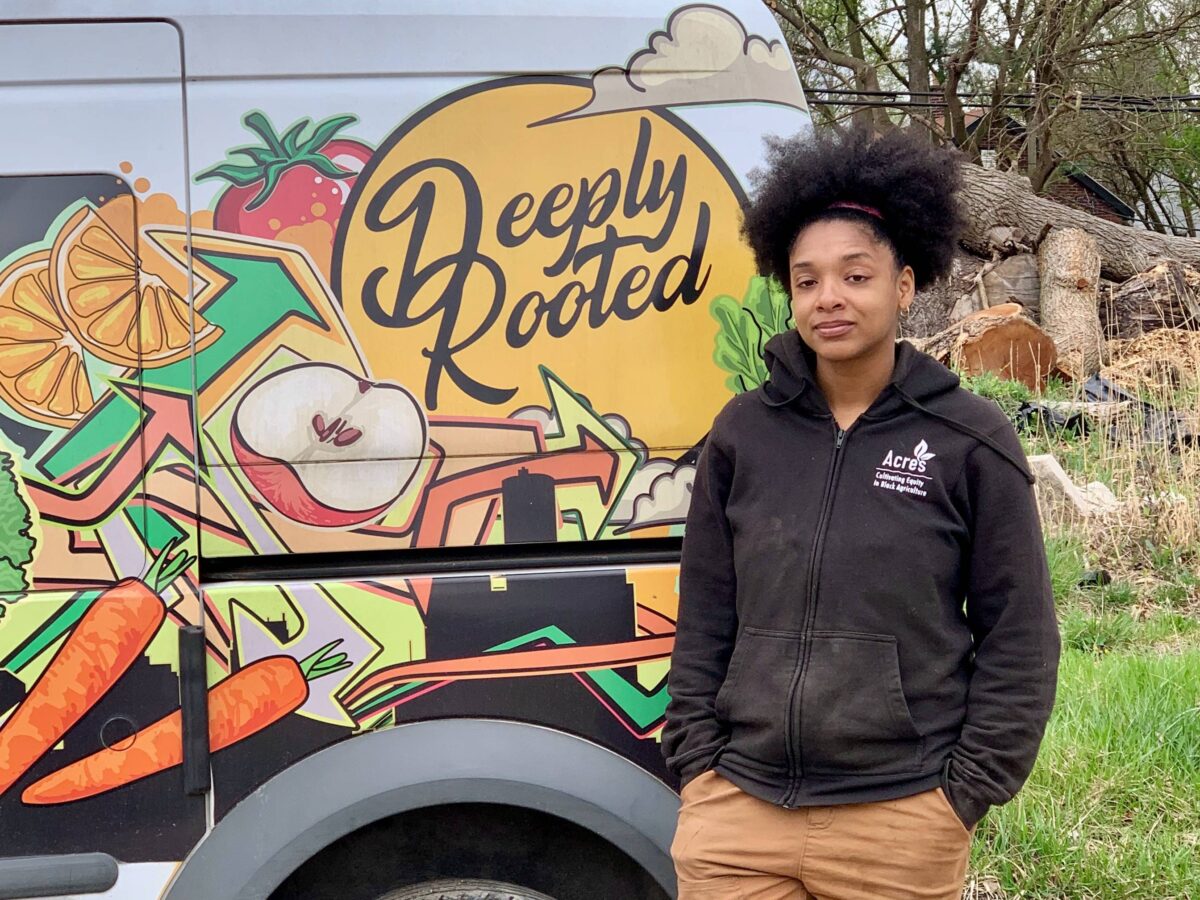Overview:
-The art gallery at the Liquor Basket Gratiot now has a name: the Push Gallery.
-"They call us the Black Store," says owner Dominick Lemonious. "That's hard. Any time the community embraces you in a way like that, that's absolutely a positive."
-Push Gallery held two shows this spring, "Community First" April 4 and "Community First Pt. 2" May 16.
This story is published as part of Planet Detroit’s 2025 Spring Neighborhood Reporting Lab, supported by The Kresge Foundation, to train community-based writers in profile writing. This year’s participants will focus on highlighting grassroots leaders driving positive change in metro Detroit.
On the last day of Black History Month, Liquor Basket Gratiot is packed. A nationwide boycott called for consumers to withhold their dollars unless they were spending with a Black-owned business, and this is the place to do it.
The Liquor Basket displays fine art where no one expects it. Paintings hang above the registers. Framed photography is placed inside the coolers.
Dominick Lemonious created more than a store at the Liquor Basket. Art and community live side by side here, and Detroiters are starting to take notice.
‘It’s a community space’
Becoming the founder of a gallery was never the plan. Art wasn’t either, not really. In high school, Lemonious would sketch classmates in the back of the room, cracking jokes, and passing the time. It wasn’t serious, just something he could do, often leaving behind a collection of unfinished portraits.
After graduating from college in 2017 with a degree in business marketing and no clear next step, he picked up a pencil again to see what would happen.
“Hey, I draw sometimes,” he remembers thinking. “Let me see if I can actually draw for real.” Once he started, Lemonious, 29, said he realized he has something worth pursuing. He’s been “making it shake” ever since.
In October 2020, during the height of the COVID-19 pandemic, his family opened Liquor Basket Gratiot, a small shop at the intersection of Gratiot and Mt. Elliott, tucked between the Faygo factory and a Save A Lot.
The walls were bare, save for “maybe a Budweiser sign,” and inventory was hard to come by. As the product offerings grew, the neighborhood took notice.
“It’s a community space. In Detroit, the culture is that people frequent corner stores and liquor stores. The fact that it’s owned by somebody that looks like the community … that’s something different,” he said.

Art takes hold at Liquor Basket
The store is on the edge of the traditional boundaries of Detroit’s historic Black Bottom neighborhood, a hub of Black-owned businesses and Black cultural vitality. Lemonious sees its imprint every day.
“This specific neighborhood has very rich bones and a lot of history, and the people in this neighborhood take that with a lot of pride, because some of them done been here for generations.”
That pride shows up in how the community receives and supports the store. “They call us the Black Store,” he said. “That’s hard. Any time the community embraces you in a way like that, that’s absolutely a positive.”
“This has also become like a place of respect,” said Lemonious. “A lot of people don’t bring the foolishness around here, because this is like a space for us.”
By 2023, things started to click artistically for Lemonious. He went from sketching to painting and was beginning to explore printmaking. He found community in the Detroit Fine Arts Breakfast Club and mentorship under fresco artist Hubert Massey.
At the same time, the idea of turning Liquor Basket into something more than a liquor store was starting to take shape.
It started with a hangout. Lemonious invited photographer Elonte Davis to shoot while he and artist Melinda Ruth worked on a printmaking project.
Davis was surprised to learn Lemonious owned a liquor store. Until then, Lemonious said he’d kept his creative life mostly separate.
“A lot of times, I don’t bring things to the forefront unless I fully understand it and can present in a way that is to my standard,” he said. “I was still working to get [the store] to where I wanted it to be.”
Back at the store, Davis suggested something that had already been on Lemonious’ mind: “You should let me put some pictures up here.” That moment got the ball rolling.
In the following days, artist Oshun Williams offered a 5-by-6 foot painting for the space that Lemonious graciously accepted.
What started as a few pieces on a wall became a growing collection. Then Williams had a solo show at the Norwest Gallery of Art.
“The whole store showed up for him,” Lemonious said. “Afterward, we had kind of an after-hours kickback at The Basket. People came from all over the city. We had music, food, art on the walls. It was cool,” he said.
Lemonious started dreaming bigger about how to use the space. When asked about his most memorable moment in the store, he doesn’t hesitate to answer: a fashion show in July 2024.
“That was crazy,” he said, laughing. It felt like being at “that house back in the day with the cool parents, that don’t mind you throwing a party.”
This time, the creatives were grown. There were vintage cars, fireworks, a crowd that spanned from neighborhood regulars to figures from Cranbrook and Library Street Collective — “people who would never just be at a liquor store on the east side after hours,” Lemonious said.
There’s no polished footage of the event; it lives on only in memory. “If you was there, you was there,” he said.
MORE FROM THE NEIGHBORHOOD REPORTING LAB
Jason Ford’s next chapter begins at Detroit People’s Food Co-op: ‘We gotta build the systems’
In Detroit’s North End, Jason Ford and the Detroit Black Community Food Sovereignty Network are empowering residents with the Detroit People’s Food Co-op, providing fresh, locally sourced foods to foster generational health and food autonomy.
How Dazmonique Carr works to improve Detroit’s food access, one produce box at a time
Dazmonique Carr’s mission of prioritizing sustainable and equitable food systems includes partnerships with BIPOC-owned farms across Michigan.
Black students sail the Detroit River with Harry Jones: ‘Water is in my DNA’
Harry Jones aims to make sailing accessible for Detroit youth, growing the Detroit Community Sailing Center from eight to 80 participants, and forging partnerships to establish the Detroit River Education Center.
Welcome to the Push Gallery
One of the models from that night was Nyionna Rowsey, a Liquor Basket employee known affectionately around the store as Nene, or “Big Drama.”
When she first started coming to The Basket as a customer, she didn’t come looking for art. She started paying attention, asking questions, and eventually, painting.
“It started to turn into appreciation,” she said. “I began to start painting a little bit, and it’s becoming more of a passion.”
Nene credits Lemonious with opening that door and so much more. “The art industry was something I never even knew about. Not only is he showing me art, he’s teaching me the ropes of collecting.”
Now a mixed media creator, Nene incorporates clay, fabric, and even hair she’s attached by hand into her paintings as a reflection of her background as a hairstylist.
“It’s wholesome. It allows me to express myself. It’s like saying what you mean without even having to use words,” she said. “Liquor Basket Gratiot turned me into an artist, an art collector, and a model.”
This year, the gallery space received an official name: Push Gallery. “Push is about pushing the culture forward, pushing something positive, just bringing people together on some cool type time,” said Lemonious.
Push Gallery’s first official show, “Community First,” opened April 4. The theme was more than a curatorial choice: it reflected how Lemonious has approached everything from the beginning.
“That’s just always a focus,” he said. “You’ve got to make sure you take care of the community.”
The show was such a success, they ran it back for “Community First Pt. 2” May 16. It was just as well-received and attended as the first iteration.
Push is not hidden behind closed doors or velvet ropes. It lives where the people are. Many of the store’s regulars live nearby. Some are longtime residents. Some are unhoused. Some are just passing through. But here, all are met with original art, right there above the coolers.
“A lot of times fine art isn’t as accessible as it should be,” Lemonious said.
“You’ve got to go all the way out the way to a gallery that closes at five o’clock. We’re open until 2 a.m. You can be like, ‘Hey, I’m bored. I’m about to go see some art.’ That’s a possibility here.”
Lemonious said he sees the difference art makes.
“A lot of people in this space don’t usually have the space or knowledge or the will for extracurricular activities,” he said. “So seeing them interact with the art, you can see them brighten up. They’ll share stories about how they used to paint or draw back in the day.”
The store has been featured in Metro Times and on local TV news, and noticed by the Detroit Institute of Arts. For Lemonious, the attention is less about personal recognition and more about helping people find the work.
“It’s important for the business,” he said. “Just building the awareness that this place exists, that all the stuff we’re doing exists.”
He hopes the experience sticks with those who visit. “When people come (to Detroit), I want them to be like, ‘dang, what’s that one store that got the art and the liquor? We gotta go there.’”





